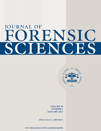A Statistical Approach Based on Accumulated Degree-days to Predict Decomposition-related Processes in Forensic Studies* ,†
Supported by FESR, NBIF, and NSERC Grants.
Presented in part at the North American Forensic Entomology Association Meeting, July 16–18, 2009, in Miami, FL.
Abstract
Abstract: Using pig carcasses exposed over 3 years in rural fields during spring, summer, and fall, we studied the relationship between decomposition stages and degree-day accumulation (i) to verify the predictability of the decomposition stages used in forensic entomology to document carcass decomposition and (ii) to build a degree-day accumulation model applicable to various decomposition-related processes. Results indicate that the decomposition stages can be predicted with accuracy from temperature records and that a reliable degree-day index can be developed to study decomposition-related processes. The development of degree-day indices opens new doors for researchers and allows for the application of inferential tools unaffected by climatic variability, as well as for the inclusion of statistics in a science that is primarily descriptive and in need of validation methods in courtroom proceedings.




